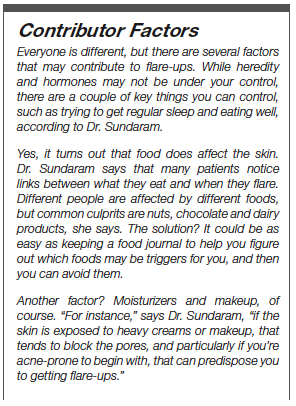Words: Heather Onorati
Time to get expert advice on the art of managing minor flares
As the fall weather gets stormy, is your acne flaring up, too? Don’t waste your time scrubbing away slick spots—that’ll only aggravate the problem further. Instead, say experts, focus on controlling those factors in your power that may contribute to breakouts and strive to balance your skin with a personalized daily skin care regimen. If your acne becomes severe, your dermatologist can recommend more intense treatments.
Defining the Spot
While acne is a fairly common condition, it affects us socially and professionally and should definitely be treated, says Hema Sundaram, M.D., founder and medical director of Sundaram Dermatology, Cosmetic & Laser Surgery Center in Rockville, Md., and Fairfax, Va. “If we’re looking across the ages, I would say that the vast majority, if not all women, are going to experience some kind of breakout at some point in their life,” she says.
Acne results from an overgrowth of the natural bacteria on the skin, explains Dr. Sundaram. It’s not an infection; bacteria build up in the hair follicles and cause inflammation, which results in the characteristic papules and pustules of acne. The best way to manage acne is to prevent it in the first place and to treat comedones (blackheads and whiteheads), which are the earliest signs of acne.
Clearing It Up


“It’s not that you need to dry out the oil, you need to balance the oil, balance the skin,” she says. “I believe the more you mimic the function of healthy skin by using ingredients that already exist in the body, like vitamins A and C, and even AHAs like lactic acid, the better the results will be with acne and other skin disorders.”
Pennell recommends a product line called Environ. “Environ uses retinyl palmitate and retinyl acetate which are both less irritating but effective forms of vitamin A,” she explains. She advises clients to use a daily skin cleanser that’s alcohol-free, a mild alpha hydroxy skin toner and an antioxidant gel that incorporates vitamins A, C, E and tea tree oil to promote cell turn over and minimize the bacteria on the skin. She also recommends a mineral makeup or moisturizer with sun protection.
Dr. Sundaram says a home remedy that may be worth trying for the occasional breakout is a mixture of yogurt, honey and neem oil for a mild chemical peel. The lactic acid in the yogurt produces a mild peeling effect while the honey and neem oil moisturize and inhibit the overgrowth of bacteria.
When you need a little more
If your acne is severe or it really bothers you, there are prescription and in-office medical treatments that can help. One of the treatment systems Dr. Sundaram dispenses is the SkinMedica Acne Treatment System (www.lovelyskin.com), which she finds very effective without drying out the skin. Antibiotics are useful for reducing inflammation, she says. Chemical peels, especially the Rejuvenize and Vitalize peels, can clear up active acne as well as fade pigmentation and superficial scarring. She also uses a microdermabrasion system (DermaSweep), which polishes the skin and then infuses it with individually tailored solutions for acne or scarring. And when you really need a little more, laser skin resurfacing treatments (like Aerolase) can help reduce blemishes and smooth out your complexion.
“Medical facials in the office can be very helpful as well to actually steam and extract out the blackheads and whiteheads, which are the original starting point for all acne,” says Dr. Sundaram.
And finally, appropriate makeup can be helpful and may even provide a healing effect, she says. A medical-grade mineral makeup like ColoreScience, which she often recommends, will help camouflage active acne as well as provide sun protection, without irritating the skin.
Bottom line: Don’t wait until your face is pitted and scarred to treat acne. “Prevention is so much better than cure,” says Dr. Sundaram.










